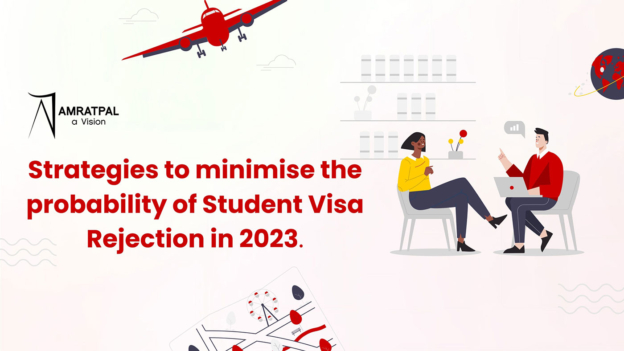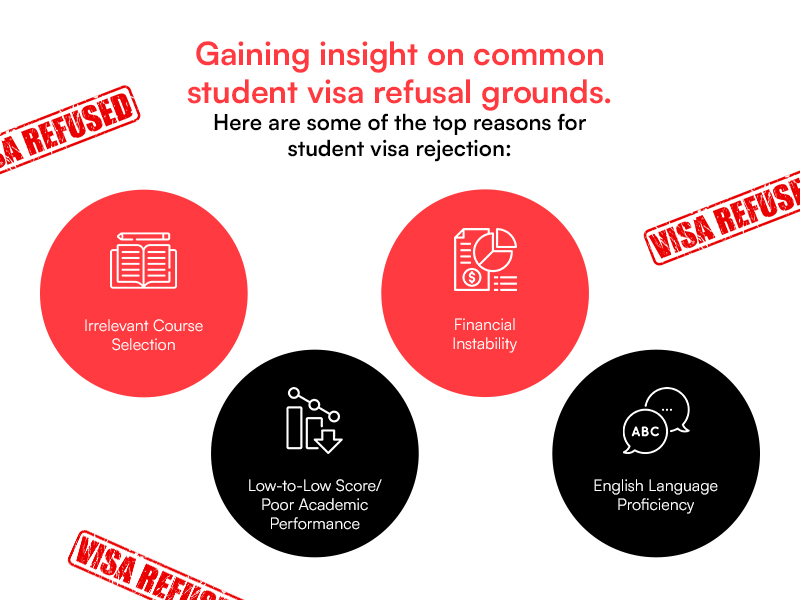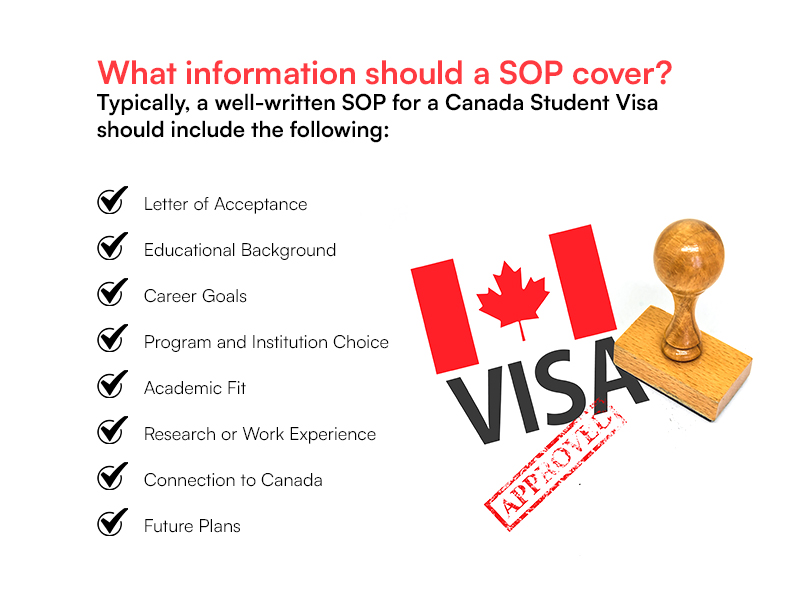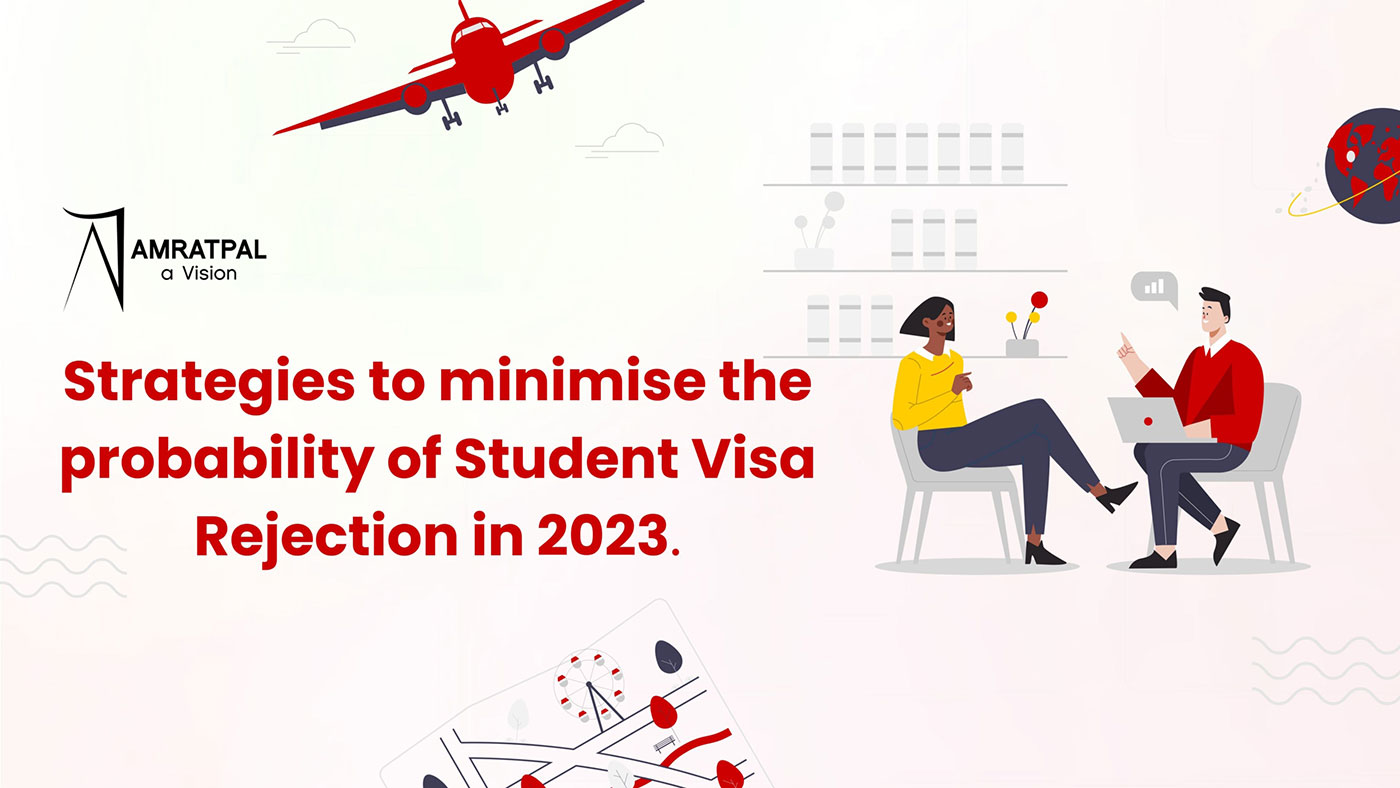Strategies to minimise the probability of Student Visa Rejection in 2023
To study in Canada as an international student, you generally need to obtain a Canadian study permit, also known as a student visa. Table of Content Requirements for obtaining Canadian Student Visa Tips to minimise the probability of student visa rejections. Gaining insight on common student visa refusal grounds. The Importance of the Statement of […]

To study in Canada as an international student, you generally need to obtain a Canadian study permit, also known as a student visa.
Table of Content
- Requirements for obtaining Canadian Student Visa
- Tips to minimise the probability of student visa rejections.
- Gaining insight on common student visa refusal grounds.
- The Importance of the Statement of Purpose (SOP) in Visa Applications: Unveiling its Critical Role in Securing a Visa Approval.
- Why Amratpal a Vision Excels in Visa Approvals: Insights into our Successful Rejection Ratio and Key Strategies.
- Conclusion
Requirements for obtaining Canadian Student Visa
To obtain a Canadian Student Visa, also known as a study permit, you need to meet certain requirements set by the Canadian government. Here are the general requirements:
- 1. Letter of Acceptance: You must have a letter of acceptance from a designated learning institution (DLI) in Canada. The institution must be approved by the Canadian government to host international students.
- 2. Proof of Financial Support: You need to demonstrate that you have enough money to cover your tuition fees, living expenses, and return transportation. This can be done by providing bank statements, scholarship letters, or a letter of financial support from a sponsor.
- 3. Application Form: You must complete the application form for a study permit, which can be obtained from the official website of Immigration, Refugees and Citizenship Canada (IRCC).
- 4. Proof of Identity: You need a valid passport or travel document that allows you to return to your home country. Ensure that your passport is valid for the duration of your intended stay in Canada.
- 5. Language Proficiency: Depending on the program and institution you are applying to, you may need to demonstrate proficiency in English or French. This is usually done through language tests such as the IELTS, TOEFL, or DELF.
- 6. Medical Examination: In some cases, you may need to undergo a medical examination to prove that you are in good health. This requirement typically applies if you plan to study in Canada for more than six months.
- 7. Police Certificate: You might be required to provide a police certificate or clearance from your home country or any country you have lived in for six months or more within the past ten years.
- 8. Photographs: You will need to provide recent passport-sized photographs that meet the specifications set by the Canadian government.
- 9. Study Plan: It is important to prepare a study plan that outlines your educational goals and how studying in Canada will contribute to your future plans.
- 10. Application Fee: There is a non-refundable application fee that must be paid when submitting your study permit application.
It's important to note that the specific requirements and procedures may vary depending on your country of residence. It is recommended to visit the official website of IRCC or consult with the Canadian embassy or consulate in your home country for the most accurate and up-to-date information regarding the requirements for obtaining a Canadian Student Visa.
Tips to minimise the probability of student visa rejections.
Here are some tips to minimise the probability of student visa rejections:
- 1. Apply Early: Start the application process well in advance to allow ample time for gathering documents, completing forms, and addressing any potential issues.
- Research and Choose a Designated Learning Institution (DLI): Select a recognized and reputable educational institution in Canada that is designated to host international students.
- 2. Meet Financial Requirements: Ensure you have sufficient funds to cover your tuition fees, living expenses, and return transportation. Provide accurate and verifiable proof of financial support.
- 3. Prepare a Strong Statement of Purpose: Clearly articulate your educational goals, intentions, and how studying in Canada aligns with your future plans. Demonstrate your genuine interest and commitment to your chosen field of study.
- 4. Maintain Strong Academic Background: Maintain good academic performance and provide evidence of your academic achievements, including transcripts, certificates, and recommendation letters.
- 5. Provide Genuine Supporting Documents: Ensure that all documents, including transcripts, certificates, and letters of recommendation, are authentic and accurately represent your qualifications and achievements.
- 6. English/French Language Proficiency: Prepare and take language proficiency tests, such as IELTS or TOEFL (for English) or DELF (for French), and achieve the required scores for your chosen program.
- 7. Be Truthful and Transparent: Fill out the application forms truthfully, providing accurate and complete information. Avoid misrepresentation or withholding information that may lead to suspicions of fraud.
- 8. Follow Visa Application Guidelines: Adhere to the specific guidelines provided by the Canadian government regarding documentation, form completion, and payment of fees.
- 9. Seek Professional Advice: Consider consulting an immigration lawyer or an experienced study abroad consultant to guide you through the application process and ensure compliance with all requirements.
- 10. Be Prepared for an Interview: If required, prepare for an interview with the Canadian visa officer. Familiarise yourself with your study program, institution, and be ready to answer questions about your study plans and intentions.
Remember, while following these tips can help minimise the chances of visa rejection, it does not guarantee approval. It's important to thoroughly review the official requirements and guidelines provided by the Canadian government and seek professional advice when necessary.
Gaining insight on common student visa refusal grounds.
Here are some of the top reasons for student visa rejection:
- Irrelevant Course Selection
- Low-to-Low Score/Poor Academic Performance
- Financial Instability
- English Language Proficiency
- Letter of Acceptance
- The immigration officer had doubts about the strength of your ties to your home country and your intent to leave Canada on completion of the course.
- Insufficient Documentation
- Biometric Rejections
Suggested Read: Canada Student Visa Rejection: Guide For Indian Students In 2023.

The Importance of the Statement of Purpose (SOP) in Visa Applications: Unveiling its Critical Role in Securing a Visa Approval.
What is a Statement of Purpose (SOP)?
A Statement of Purpose (SOP) for a Canada Student Visa is a document that outlines your educational background, academic goals, and reasons for choosing to study in Canada. It provides insights into your motivations, aspirations, and how pursuing education in Canada aligns with your future plans.
The SOP is an opportunity for you to present a compelling case to the Canadian visa officers, demonstrating your genuine interest in your chosen field of study and the value you intend to derive from your educational experience in Canada. It allows you to explain why you have selected a particular program, institution, and how it aligns with your academic and career goals.
What information should a SOP cover?
Typically, a well-written SOP for a Canada Student Visa should include the following:
- Introduction
- Educational Background
- Career Goals
- Program and Institution Choice
- Academic Fit
- Research or Work Experience
- Connection to Canada
- Future Plans
It's important to tailor your SOP to reflect your personal experiences, aspirations, and motivations. Avoid plagiarism, be honest, and use clear and concise language to effectively convey your thoughts. The SOP should showcase your genuine enthusiasm, commitment, and readiness to undertake your chosen academic journey in Canada.
Suggested Read: Contents of an SOP
Reapplying after Visa Rejection: Crafting an Effective SOP and Justification Letter.
Yes, in case of a visa rejection, it is recommended to prepare a well-crafted Statement of Purpose (SOP) along with a Justification Letter. These documents are crucial in addressing the grounds for the previous visa refusal and presenting a compelling case for your re-application.
The SOP should be revised and strengthened to address any concerns or weaknesses that may have led to the initial rejection. It is essential to provide a clear explanation of why you are re-applying, highlighting any changes or improvements you have made since the previous application.
In addition to the SOP, a Justification Letter is also beneficial. This letter allows you to provide a detailed explanation of the reasons for re-applying, addressing the specific grounds of refusal mentioned by the visa officer. It's important to demonstrate that you have thoroughly understood the reasons for the initial rejection and have taken appropriate measures to rectify any issues.
Both the SOP and Justification Letter should be concise, well-structured, and effectively communicate your genuine intentions, qualifications, and motivations. It is essential to provide strong supporting evidence, such as updated academic transcripts, improved language test scores, or additional letters of recommendation, to strengthen your re-application.
Remember to carefully review the specific visa requirements and guidelines provided by the Canadian government or the relevant immigration authorities to ensure that your SOP and Justification Letter meet all the necessary criteria. Seeking professional advice or guidance from an immigration lawyer or study abroad consultant can also help prepare a compelling re-application package.

Why Amratpal a Vision Excels in Visa Approvals: Insights into our Successful Rejection Ratio and Key Strategies.
At Amratpal a Vision, our reputation is built on our ability to handle challenging and rejected visa cases, consistently achieving visa approvals. The key to our remarkable success lies in our meticulous approach to documentation, crafting precise and compelling Statements of Purpose (SOPs), and effectively addressing the grounds for previous rejections.
At Amratpal a Vision, we are dedicated to helping our clients overcome visa challenges and turn their dreams of studying in Canada into a reality.
Conclusion
In conclusion, understanding and implementing effective strategies to minimise the probability of student visa rejection is crucial for aspiring international students in 2023. It is essential to stay informed, be proactive, and diligently prepare a strong application that showcases your qualifications, intentions, and genuine commitment to your educational pursuits in Canada.
By following these strategies, you can enhance your chances of securing a student visa and pursuing your educational dreams in Canada. With careful planning and thorough execution, you can turn your dreams of studying in Canada into a reality.



